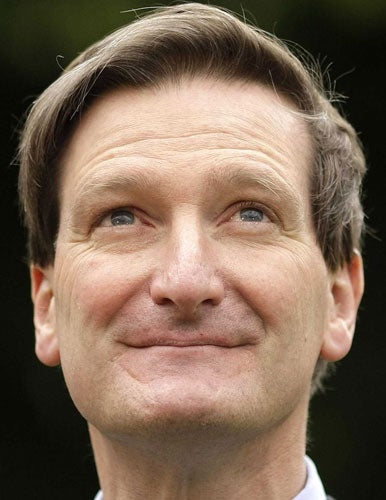Tories vow to empower citizens in fight against low-level crime
Police should use common sense, not 'waste time' on trivial offences, says Grieve

Adults who rebuke unruly youngsters will be given added protection from prosecution under a return to "common sense" policing, Dominic Grieve, the shadow Home Secretary, has said.
He said a new Conservative government would act within days to rewrite guidelines to officers and prosecutors to ensure that people were not targeted for taking the fight against low-level disorder into their own hands.
In an interview with The Independent, Mr Grieve said people were feeling forced to "bleat" to the police about minor problems, while officers were also forced to waste their time investigating trivial complaints. He said he wanted to "reprofessionalise" police officers and ensure they would stop investigating minor offences and instead back up civic-minded householders.
Mr Grieve said his party's planned, elected police commissioners would be tasked to ensure that people were encouraged to stand up to anti-social behaviour and pledged to use the Home Office to stop people being deterred for standing up for traditional good behaviour. Rebalancing the system to prevent police being called to deal with minor incidents that would be best settled between people themselves was important, he added.
Mr Grieve also signalled that the Conservatives would have a New Year policy drive aimed at ending the "conveyor belt to crime", praising initiatives championed by the former party leader Iain Duncan Smith to target children at risk of falling into delinquency before they enter school.
Under Conservative plans, guidelines for police contained in the Police and Criminal Evidence Act would be rewritten to give officers more discretion when dealing with people who intervene to prevent a crime. Guidelines for the Crown Prosecution Service would also be amended to ensure they "take account" of actions intended to prevent a crime, in a "double lock" intended to ensure that people who take reasonable steps to intervene to prevent disturbances are not faced with unfair prosecution.
Mr Grieve insisted he did not want to promote vigilantism or defend people who used excessive force but said he wanted to stop people feeling that they could not intervene in their own neighbourhoods to prevent bad behaviour.
Mr Grieve said: "There is no doubt – the police say that their discretion has been eroded. If somebody comes in to a police station and makes an allegation clearly of the most trivial character they nevertheless have to record it, to investigate it, go through a process of dealing with it which may involve going round and confronting the person against whom the trivial allegation has been made.
"Equally, the public seem to have become tremendously willing to go running off to the police to bleat about the most minor matters. In part that may be because of the perception that they are so regulated and controlled in every other way that there is nothing they can do about problems and they have got to go to the police to solve them. If people feel they cannot tell children to stop misbehaving, that will fester and they will have a perception that things are very bad. History shows that if you go out and tell 10 and 11-year-olds who are misbehaving to stop misbehaving or you will call the police, they will stop.
"There is also the need for police back-up, but the public have also come round to seeing the police as more likely to bite them than do something about the problems in the community around them. They also say: 'Oh well, if I try to stop that, someone will come round to arrest me.' Most of the complaints being made by the public are about quite low level anti-social behaviour issues about children and adolescents. I don't believe these problems didn't exist in the past, but in the past they were controlled because adults felt confident in tackling these problems themselves, not by being vigilantes, but by being sensible citizens.
Subscribe to Independent Premium to bookmark this article
Want to bookmark your favourite articles and stories to read or reference later? Start your Independent Premium subscription today.
